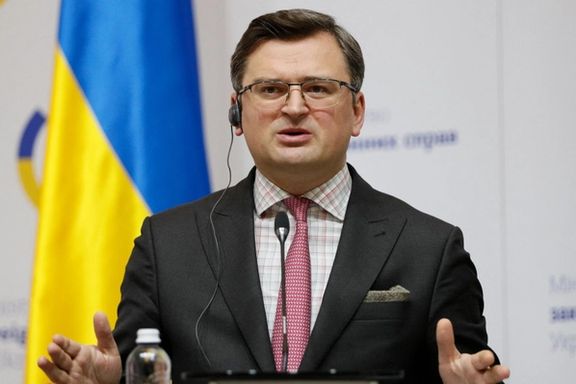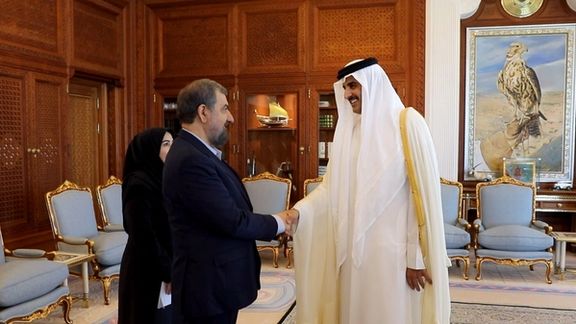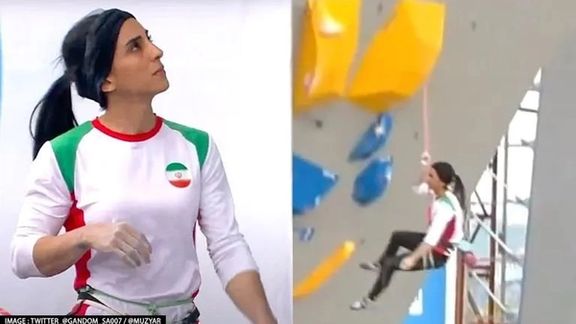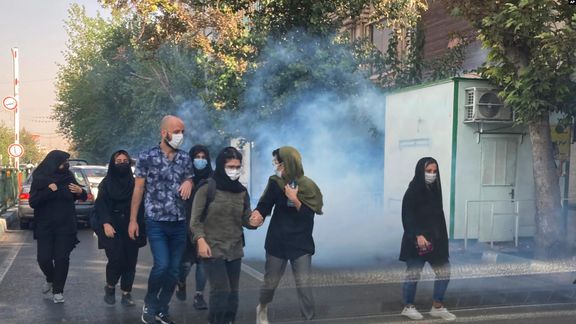Australia Must Act To Remove Iran From UN Commission - Lawmaker

An Australian MP says Canberra must designate Iran's Revolutionary Guard as a terrorist organization and cooperate with UN states to remove Iran from the women commission.

An Australian MP says Canberra must designate Iran's Revolutionary Guard as a terrorist organization and cooperate with UN states to remove Iran from the women commission.
Monique Ryan told Iran International’s correspondent that the government of Prime Minister Anthony Albanese should also work with other UN states to remove Iran from United Nations Commission on the Status of Women (CSW) amid the Islamic Republic's crackdown on the current uprising spearheaded by Iranian women and ignited by the death in custody of 22-year-old Mahsa Amini.
Expressing grave concern over “what has been done to young people in Iran by the government,” she praised the courage of people “for standing up for their rights.” She added, “Being physically punished for that is deeply shocking and very concerning for all Australians.”
Referring to a letter to the Albanese Government signed by her as well as several other lawmakers, she said they called on Canberra to act “more forcefully to express the repugnance felt by the Australian people towards the recent treatment of peaceful demonstrators."
She said they specifically requested Magnitsky-style targeted sanctions including financial asset freezes and travel bans against members of the Revolutionary Guards (IRGC), key security officials and the so-called morality police. “We also asked the government to declare the IRGC as a terrorist force as has been done in the US and Canada,” she said, adding that they also called on the government to join other states to remove Iran from the UN Commission on the Status of Women.

Foreign Minister Dmytro Kuleba said Tuesday he had called on President Volodymyr Zelenskyy to break off Ukraine’s diplomatic relations with Iran.
Kuleba said Kyiv was willing to share a “bag of evidence” with the European Union that Russia had used Iranian-made military drones in the current conflict. The EU is currently considering sanctions against Iran should the Ukrainian claims be proved.
Russia used dozens of ‘kamikaze’ drones in attacks Monday that Ukraine says were Shahed-136s, killing four people in Kyiv. “Tehran bears full responsibility for the destruction of relations with Ukraine”, Kuleba told a news conference.
While Iran has denied supplying drones to Russia, analysts point out they could be a cheap if less effective alternative to Russia’s diminishing stocks of missiles. The State Department’s Vedant Patel Monday backed up Ukraine’s claims, saying there was “extensive proof” Russia was using Iranian-made drones.
Iran has been a close military ally of Russia in the Syrian war, where Moscow supplies air power and Tehran tens of thousands of militia ground troops to defeat the opponents of Bashar al Assad's government.
Iran's Supreme Leader Ali Khamenei also backed Vladimir Putin in July by praising the Russian leader's "initiative in in invading Ukraine.
‘Pressure on Israel’
In his press conference, Kuleba also said Kyiv would send an official note to Israel seeking military aid including air defense supplies. Disappointed at Israel’s refusal to supply weapons, Ukrainian officials have sought to highlight Iran’s relationship with Russia.
Ukraine and Iran have maintained diplomatic relations despite disagreements and an exchange of sharp language over the January 2020 shooting down by Iranian air defenses of a Ukrainian passenger plane, killing all 176 aboard, during heighted US-Iran tensions.
In an analysis Tuesday, the New York Times argued that a Tehran-Moscow “alliance” was “raising the pressure on Israel, Iran’s sworn enemy, to take Ukraine’s side in the war.”
On Sunday Nachman Shai, Israel’s Minister for Diaspora Affairs, argued for sending military aid to Kyiv on top of existing humanitarian relief. But Tuesday, before Kuleba’s remarks, Justice Minister Gideon Saar, who sits on Israel’s decision-making security cabinet, told national broadcaster Army Radio that Israel’s support for Kyiv “does not include weapons systems and weaponry - and there is no change to that position.”
‘Reckless’ supply
Dmitri Medvedev, deputy head of Russia’s Security Council, warned Monday that “reckless” supply of Israeli hardware would “destroy all interstate relations between our countries.” Around 15 percent of voters in Israel, where there is a general election November 1, are Russian-speakers. Israel has also had intelligence coordination with Russia in Syria, where both air-forces have operated during the decade-long conflict.
Ukraine has been successful gaining military aid from the European Union, whose foreign ministers’ meeting in Luxemburg Kuleba addressed virtually Tuesday “from the bomb shelter.” The foreign minister tweeted that he had asked the Europeans for “more air defense and ammunition” and for “sanctions against Iran for supplying the Russian Federation with drones.” The EU announced Tuesday a further €500-million ($492 million) military supplies to Ukraine, bringing the total to €3.1 billion ($3.01 billion). United States support is around $17 billion so far.

Argentina has called on Qatar to arrest visiting Iranian vice president Mohsen Rezaei over his alleged responsibility for the deadly 1994 bombing of a Buenos Aires Jewish center.
According to the official Telam news agency on Monday, special prosecutors have submitted a petition to Argentina's foreign ministry calling for all appropriate diplomatic levers to be pulled.
The ministry "requested the collaboration of Interpol for the arrest," while Foreign Minister Santiago Cafiero "instructed the Argentine ambassador in Doha... to communicate urgently with the Qatari Foreign Ministry and report on the situation," a diplomatic source said.
Ebrahim Raisi’s vice president for economic affairs, Revolutionary Guard’s commander Rezaei (Rezai) is wanted by Argentinian special prosecutors for alleged participation in the planning of the July 18, 1994 bombing of the Argentine Israelite Mutual Association, or AMIA, which killed 85 people and wounded 300.
In 2007, INTERPOL General Assembly upheld the unanimous decision made by the organization’s Executive Committee to publish six out of nine Red Notices requested in connection with the AMIA.
The notices were requested by the Argentinean National Central Bureau (NCB) for Imad Fayez Moughnieh, the number two in Iran-backed Hezbollah, Iran’s Former Intelligence Minister Ali Fallahian, Cleric Mohsen Rabbani – known as the chief architect of Iran's Latin American missionary network -- Iranian diplomat Ahmad Reza Asghari – aka Hamid-Reza Es’hagi and Moshen Ranjbaran -- and Revolutionary Guards commander and incumbent Interior Minister Ahmad Vahidi as well as Mohsen Rezaei.
Earlier in the year, Argentina condemned the presence of Rezaei in the inauguration of the new Nicaraguan president Daniel Ortega, describing it as an insult to the victims of the bombing of the Jewish center.

There are conflicting reports over the fate of Iranian athlete Elnaz Rekabi who competed at the Asian Climbing Competitions finals in Seoul without wearing hijab.
Disobeying the Islamic Republic's restrictions for female athletes, she made history by representing Iran unveiled in support of anti-hijab and antigovernment protests that have been raging across the country since mid-September, when 22-year-old Mahsa Amini was killed in custody of hijab police.
Worried that she would be arrested upon arrival, people had organized a huge gathering to welcome her early on Wednesday morning when she was scheduled to arrive back in the country. But, reports came late on Monday that her travel documents were confiscated by officials, who are part of all Iranian sport delegations abroad to monitor and control the behavior of athletes. For some hours, unconfirmed reports said she was prevented from leaving the hotel where the Iranian delegation were staying in Seoul.
The latest on her whereabouts was a post on her Instagram page, in which she said she is on her way back home as scheduled, explaining that she had to appear for the final without head covering due to miscalculations of the final schedule. People on social media do not seem to believe such claims as they are accustomed to fabricated justifications and forced confessions extracted by the Islamic republic’s authorities.
Emphasizing that they are monitoring the case of the Iranian rock climber, the International Federation of Sport Climbing (IFSC) said, "There is a lot of information in the public sphere regarding Elnaz Rekabi and as an organization we have been trying to establish the facts. We have also been in contact with Ms. Rekabi and the Iranian Climbing Federation.”
In 2019, boxer Sadaf Khadem attended a boxing match with the Iranian flag and without a headscarf. She had to cancel her return flight to Tehran after a warrant was issued for her arrest.

Workers in many industries have joined the strikes which have been gaining momentum since last week as Iran’s antigovernment protest movement has entered its second month.
On Tuesday, the workers of Haft-Tappeh Sugarcane complex in the southwestern Khuzestan province joined the strikes in oil, gas, and petrochemical sectors in southern Iran.
Workers of several phases of South Pars Gas-Condensate field, Bushehr Petrochemical Company and Hengam Petrochemical Company -- both of which operate at Asalouyeh Complex -- Abadan Petrochemical company and refinery, Mahshahr’s refinery and Pipe Mill Plant, as well as Neyriz Ghadir Steel Complex off the coasts of the Persian Gulf have been on strikes in solidarity with the protests across Iran, ignited by the death in custody of 22-year-old Mahsa Amini.
At least 100 striking employees of Assalouyeh petrochemical plant have been arrested in the past few days while many are threatened with being fired or replaced by Chinese workers if they do not break their strike.
The government has blocked access to mobile Internet to prevent videos of the strikes from being posted on social media.
Security agents have summoned many workers to force them into confessing that the strikes are because of long overdue wages, and not in support of the antigovernment and anti-hijab protests. Although it is a fact that many of the workers have not been paid for months, they have repeatedly announced that their strike is in opposition to the heavy-handed crackdown on protesters.

The antigovernment movement in Iran continued Monday with demonstrations at universities, clashes on streets and strikes of workers of petrochemical plants in the south.
Protests started Monday morning in several universities across the country. According to social media videos, the clashes at the Social Sciences Faculty of the University of Tehran were so violent that people compared them with the incidents at the Sharif University earlier in October in which a large number of students were beaten and arrested.
Security forces in the University of Mazandaran in northern Iran violently cracked down on a demonstration by students who were chanting to gather support for the protests.
Azad University of Shahr-e Kord, the capital city of Chaharmahal and Bakhtiari province, the Art University of Tabriz in northwestern Iran, the Persian Gulf University in the southern province of Bushehr and Ardabil University of Medical Sciences were also scenes of gatherings by students who were chanting antigovernment slogans.
Later Monday evening, security forces were reported to have attacked women’s dormitories in the city of Rasht in northern Gilan province, beating and terrifying the students.
In addition to university students, high schoolers have also joined the protests – sparked by the death in custody of Mahsa Amini, a 22-year-old girl from the Kurdish majority city of Saqqez.
Schoolgirls have become especially engaged in the protests since the death of a student, identified as Asra Panahi, who died of internal bleeding after she was beaten by Basij paramilitary forces who attacked their school in the city of Ardabil. School officials tried to force the students to sing the propaganda song “Hello Commander” in praise of Iran’s ruler Ali Khamenei, but when some students refused, government agents showed up, beating and assaulting the girls. Another student is reportedly hospitalized in critical condition.
In several cities, including the capital Tehran and Karaj, schoolgirls are seen spraying black paint on pictures of Supreme Leader Khamenei, and replacing it with a photo of Mahsa Amini.
The nationwide protests are backed by many workers in the oil industry who have been holding strikes for at least a week now. At least 100 striking employees of Assalouyeh petrochemical plant off the coasts of the Persian Gulf have been arrested in the past few days while many are being threatened to be fired if they do not break their strike. Despite the threats, more sections of the company announced on Monday that they will join the strikes on Tuesday.
The streets in many cities were also the battleground between people and security forces on Monday from noon through the night, with reports of bloody skirmishes in the city of Abdanan, located in the south of Ilam province, and Piranshahr in in West Azarbaijan province as well as Zahedan, the capital of Sistan and Baluchestan Province.
A video from the central province of Esfahan showed a man throwing a Molotov cocktail at the entrance of the seminary of the city of Fouladshahr.